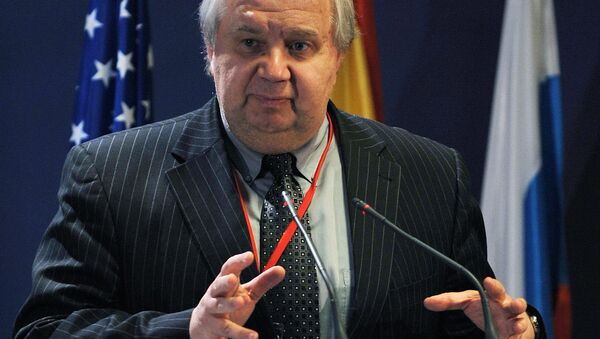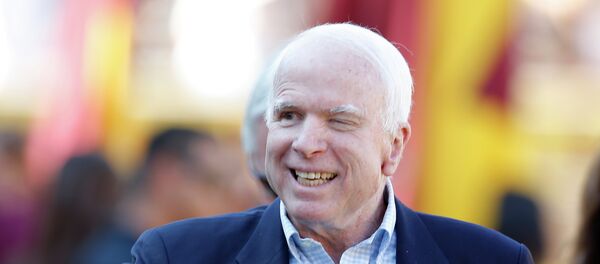PSKOV (Sputnik) — Russian Ambassador to the United States Sergei Kislyak's ongoing defamation in Washington causes consternation in Moscow, Russian Deputy Foreign Minister Sergei Ryabkov said Tuesday.
"We do not publicize information on any of the working contacts of the ambassador, any employee of the Russian diplomatic service," Ryabkov told reporters.
He attributed the lack of disclosures to a "violation of the canons of foreign policy department work," and "not because we are feeling a certain discomfort in this situation."
"The ongoing defamation of the head of the Russian diplomatic mission in Washington can cause nothing but indignation," Ryabkov stressed.
"We want to change the negative trend in both politics and the economy, we will work in this direction," he said.
Donald Trump has repeatedly advocated establishing a political dialogue with Moscow, particularly in regards to the fight against terrorism, and expressed readiness to build positive relations with Russia. Moscow has long been promoting the idea of fruitful cooperation with Washington.
"The new period of contacts and interaction with the Trump Administration has not yet been marked by major shifts for the better. This causes us some concern, and we are dealing with these problems at the Ministry of Foreign Affairs as a matter of priority," Ryabkov said.
Russian-US relations have turned into a tool of political rivalry inside Washington, he said.
"Unfortunately, Russia, as well as relations with Russia, changed into a tool of internal political struggle in the United States. We may only regret that those who use relations with Russia in their self-serving disgraceful political aims do not take into account the necessity of establishing dialogue and partnership between the two great powers," Ryabkov said while commending US media reports that US President Donald Trump's son-in-law and senior adviser Jared Kushner and Kislyak allegedly discussed setting up a communication channel between Trump and Russian President Vladimir Putin.
The deputy foreign minister stressed that Russia had never interfered in US internal affairs, yet this story continues to circulate within certain US political camps.
"Particularly alarming are attempts by certain circles to use the Russian factor in the domestic political context. This is an alarming moment, which unfortunately we have not yet gotten rid of," Ryabkov said at a forum on bilateral ties.
A wide range of things on the international agenda depended on relations between Moscow and Washington, however, there are figures "who create a background which impedes the development of our relations," such as US senator John McCain, known as a strong critic of Russia's policies, and "who issued a new batch of shameless, coarse statements."
On Monday, McCain claimed that Russia's President Vladimir Putin represented a greater threat to international security than the Daesh.
"Unfortunately, we have to state that the Trump administration, at least in the signals we hear from it, is still on the previous path, presenting the same Minsk agreements as a precondition for the normalization of relations, which is unproductive and turns into a brake for work on other directions," Ryabkov told reporters.
In February 2015, Kiev forces and Donbass independence supporters signed a peace agreement in the Belarusian capital of Minsk. The deal stipulates a full ceasefire, weapons withdrawal from the line of contact in Donbass, as well as constitutional reforms that would give a special status to the Donetsk and Lugansk People's Republics. Despite the agreement brokered by the Normandy Four states (Russia, France, Germany and Ukraine), the ceasefire regime is regularly violated, with both sides accusing each other of multiple breaches, undermining the terms of the accord.



